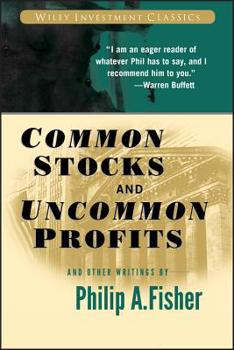Common Stocks and Uncommon Profits and Other Writings
Select Format
Select Condition 
Book Overview
Philip Fisher gilt als einer der Pioniere der modernen Investmenttheorie und z?hlt zu den einflussreichsten Investoren aller Zeiten.
Seine Investmentphilosophien, die er vor fast 40 vorgestellt hat, werden nicht nur von modernen Finanzexperten und Investoren - inklusive Warren Buffett - studiert und angewendet, sondern gelten f?r viele als das Evangelium schlechthin.
"Common Stocks and Uncommon Profits and Other Writings" ist die...
Format:Paperback
Language:English
ISBN:0471445509
ISBN13:9780471445500
Release Date:August 2003
Publisher:Wiley
Length:292 Pages
Weight:0.90 lbs.
Dimensions:0.8" x 6.0" x 9.0"
Customer Reviews
3 ratings
Easy to read book, some advice not practical
Published by Thriftbooks.com User , 22 years ago
Common Stocks and Uncommon Profits is one of the classic investment texts written for the lay person. Rather than just seeking value, Fisher realized that even a greatly "undervalued" company could prove a horrible investment. Sure, you might occasionally buy a stock for less than the company's cash-in-the-bank (back then, at least!). But what if the business is horribly run? It might not take long for the company to lose all that cash!Even if the company returns to "fair" value, that ends the potential profit from investing in such a business. Holding an average company, because it was once undervalued, but is no more, makes little sense.Fisher points out that the largest wealth via investing has been made in one of two ways. First, buying stocks when the markets crash and holding them until the markets recover. Secondly, with less risk and more potential return, you can also just invest in a small portfolio of companies which continue to strongly grow sales and earnings over the years. Then, if the company was correctly selected, you might never have to sell, while accruing a huge return on your initial investment.Fisher pioneered the school of growth stock investing. In Common Stocks and Uncommon Profits, Fisher explains how he selects a growth company. He lists fifteen points which a company must have to be considered a superior investment.Fisher's first point seems obvious: "Does the company have products or services with sufficient market potential to make possible a sizeable increase in sales for at least several years?"Fisher shows that some companies might have potential substantial sales increases for only a few years, but after that have limited potential due to some factor, such as market saturation. For example, Fisher mentions the growth in sales of TV's until the U.S. market was saturated.He also wisely suggests looking behind the products to seek other superior investments. While many TV manufacturers were competitive and it was difficult to tell which was best, Fisher points out that Corning Glass Works was, by far, the company most capable of producing the glass bulbs used in TVs.Fisher tries to clearly distinguish between companies which are "fortunate and able" and those which are "fortunate because they are able." The second kind, the superior investments, are highly innovative and create new products which have growth potential. Fisher uses Dow Chemical as one example of a "fortunate because they are able" company.The second point wants to know if management has the drive to innovate new products. A man ahead of his time, Fisher wonders about how much of a company's future sales might come from products not yet invented.A constant theme of Common Stocks and Uncommon Profits is examining what the company is doing to prepare for the future. Is the company spending wisely on Research and Development? Or, is the company just trying to maximize its current profit and reinvesting nothing for future growth? Fisher explains why answ
solid principles stand over time
Published by Thriftbooks.com User , 24 years ago
I've not heard of the name "Philip Fisher" in my entire school years (4 yrs Undergrad. b-school & 2 yrs MBA) even I've been majoring in Finance. The "fundamental" approach in investing, as opposed to looking at a "beta", has been so ignored by the academica as it's "not objective enough" or that it has no math involved. Indeed, the book is 95% art & 5% science, and there're no certain ways to pick up the technique. However, the book makes so much sense to me that I had to read it twice. The principles are sound and stand through the test of time. Most investing books disappear after a few years, and this one is still as good. Some of the techniques are hard to put into practice such as "getting to know the management" and "investigate the competitors", but this book lets you know that selecting an outstanding long term investment involves more homeworks than most people are willing to do nowaday. The tradeoff btw. "easy money" and risk always exists even in today's stockmarket most people don't know what kind of risk they're undertaking.
Solid read; practical ideas
Published by Thriftbooks.com User , 27 years ago
This book is a classic in the investment field. Fisher is acknowledged as one of Warren Buffet's intellectual fathers and it shows. However - like many books on Buffett - Fisher's approach relies on the ability of the individual to spend large amounts of time researching companies and stocks. While this minimizes the risk of investing badly, it also assumes that picking stocks is your life. I recommend that anyone interested in investing read this text as an example of how to think about companies in which to invest. However, be prepared that it won't be as directly usuable as, say, the writings of Peter Lynch.





